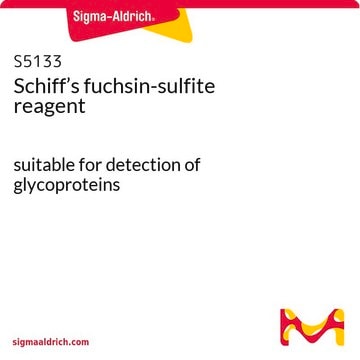Recommended Products
form
solution
shelf life
Expiry date on the label
IVD
for in vitro diagnostic use
pH
<2.0
application(s)
hematology
histology
shipped in
wet ice
storage temp.
2-8°C
Application
Intended for use in Sigma Periodic Acid Staining Procedure, 395. Kit is intended for use with blood, bone marrow, tissue touch preparations or routine tissue sections.
Components
Pararosaniline, 1% and sodium metabisulfate, 4%, in hydrochloric acid, 0.25 mol/L
Other Notes
Use Sigma reagent S5133 for staining glycoproteins in polyacrylamide gels.
Signal Word
Danger
Hazard Statements
Precautionary Statements
Hazard Classifications
Carc. 1B - Eye Dam. 1 - Met. Corr. 1
Storage Class Code
6.1D - Non-combustible acute toxic Cat.3 / toxic hazardous materials or hazardous materials causing chronic effects
WGK
WGK 3
Flash Point(F)
Not applicable
Flash Point(C)
Not applicable
Certificates of Analysis (COA)
Search for Certificates of Analysis (COA) by entering the products Lot/Batch Number. Lot and Batch Numbers can be found on a product’s label following the words ‘Lot’ or ‘Batch’.
Already Own This Product?
Find documentation for the products that you have recently purchased in the Document Library.
Customers Also Viewed
Rüdiger Braun et al.
Clinical cancer research : an official journal of the American Association for Cancer Research, 26(13), 3468-3480 (2020-04-08)
The standard treatment of patients with locally advanced rectal cancer consists of preoperative chemoradiotherapy (CRT) followed by surgery. However, the response of individual tumors to CRT is extremely diverse, presenting a clinical dilemma. This broad variability in treatment response is
Naser Mobarra et al.
International journal of hematology-oncology and stem cell research, 8(4), 20-29 (2015-03-17)
The use of stem cells is considered as an appropriate source in cell therapy and tissue engineering. Differentiation of human induced Pluripotent Stem Cells (hiPSCs) to Hepatocyte-like Cells (HLCs) on mouse embryonic fibroblasts (MEFs) feeders is confronted with several problems
Yan-Yan Song et al.
Oncology letters, 8(1), 431-437 (2014-06-25)
Vasculogenic mimicry (VM) formation is important for invasion and metastasis of tumor cells in gastric adenocarcinoma (GAC). The present study aimed to investigate the association between signal transducer and activator of transcription-3 (STAT3), phosphor-STAT3 (p-STAT3), hypoxia-inducible factor-1α (HIF-1α) and VM
Priti Chougule et al.
Scandinavian journal of gastroenterology, 47(11), 1334-1343 (2012-09-05)
Cell culture studies of enterocytes are important in many fields. However, there are difficulties in obtaining cell lines from adult human intestine, such as microbial contamination of cultures from the tissue samples, short life span of enterocytes, overgrowth of mesenchymal
Yael Aylon et al.
Genes & development, 30(7), 786-797 (2016-03-26)
The Hippo signaling pathway is a major regulator of organ size. In the liver, Hippo pathway deregulation promotes hyperplasia and hepatocellular carcinoma primarily through hyperactivation of its downstream effector, YAP. The LATS2 tumor suppressor is a core member of the
Our team of scientists has experience in all areas of research including Life Science, Material Science, Chemical Synthesis, Chromatography, Analytical and many others.
Contact Technical Service











